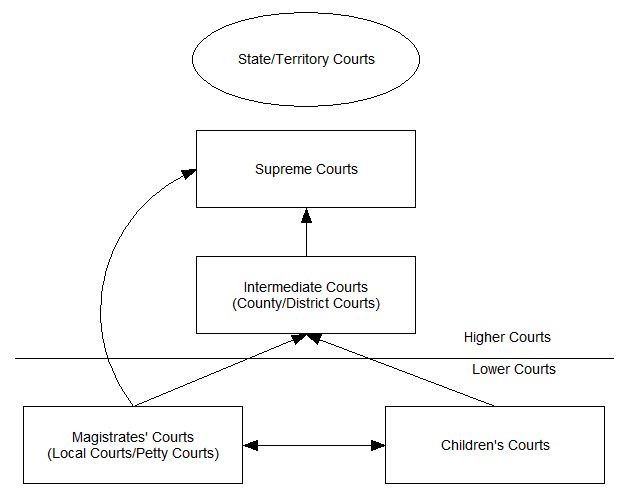Higher, Magistrates' and Children's Courts
There are different levels of courts, which deal with different types of matters. In addition, all courts are divided into criminal and civil jurisdictions. The civil jurisdiction deals with matters of a non-criminal nature, such as claims for damages. The civil courts are outside the scope of this publication. Some parts of the criminal jurisdiction are also out of scope, such as the outcomes of specialist courts. Cases processed by specialist courts may commence in the Higher, Magistrates' or Children's Courts and, if so, will be counted in this publication as finalised by transfer to another court.
Within the criminal jurisdiction, all states and territories have a Supreme Court that deals with the most serious criminal matters, generally referred to as indictable offences. These offences include murder, manslaughter and drug trafficking as well as serious sexual offences, robberies and assaults. The larger states (New South Wales, Victoria, Queensland, South Australia and Western Australia) also have an intermediate level of court, known as the District Court or County Court, that deals with the majority of serious offences. In this publication, the Supreme Courts and Intermediate Courts are collectively referred to as the Higher Courts.
All defendants that are dealt with by the Higher Courts have an automatic entitlement to a trial before a judge and jury. In some states and territories, the defendant may elect to have the matter heard before a judge alone.
The lowest level of criminal court is the Magistrates’ Court, also known as the Court of Summary Jurisdiction, Local Court or Court of Petty Sessions. The majority of all criminal cases are heard in these courts. Cases heard in the Magistrates’ Courts do not involve a jury as a magistrate determines whether the defendant is guilty or not guilty. This is known as a summary proceeding.
Each state and territory has Children's Courts to deal with offences alleged to have been committed by young people. These courts mainly deal with summary proceedings, however in some jurisdictions they also have the power to hear indictable matters. The maximum age that defendants are considered a child or juvenile is under the age of 18 years in all states and territories, except Queensland, where defendants are considered adults if aged 17 years or over at the time the offence was committed.
There are differences between the states and territories in the way the Higher Courts, Magistrates' Courts and Children's Courts systems are structured. Legislation differs between states and territories regarding which offence types can be heard summarily or otherwise in the Magistrates' or Children's Courts and which offence types must be heard on indictment.

 Print Page
Print Page
 Print All
Print All
 Quality Declaration
Quality Declaration